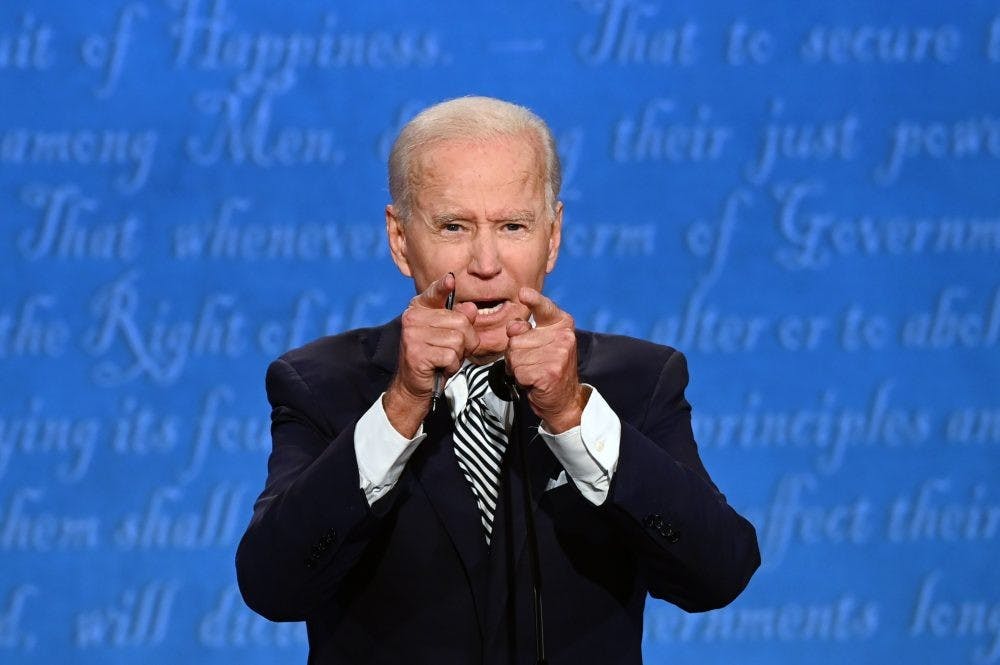Months ago, in his speech accepting the Democratic nomination, Joe Biden quoted the Irish poet Seamus Heaney. “The longed-for tidal wave of justice can rise up,” Biden told us, “and hope and history rhyme.”
But if there is rhyme to be heard, it lies beyond the current discord. The first presidential debate serves as a clear reminder that the hope of our tomorrow clashes with the history of our time. Amid President Trump’s continuous interruptions — totaling 128 in number — Biden faltered. “Will you shut up, man?” he said in exasperation, his frown hanging towards the floor.
The moment reflects a breakdown of discourse now commonplace throughout the nation. The exasperation Biden displayed with the President was not new: it was the latest end of the slow burn. For years, countless people have felt a mounting anger and weariness — an exhausting mix that reached Biden in what should have been his time to unite, heal, and lead. Instead, discourse turned into disaster on the stage, just as it has nearly everywhere else.
Still, Biden’s performance, and the debate as a whole, offers a valuable lesson. The debate demonstrates not only why discourse cannot survive without restraint, but also why restraint can be a powerful tool to display moral character. As students forming Princeton University’s discourse, and as young adults shaping our own personal characters, we cannot minimize this lesson in restraint. Without it, the future we create is more likely to repeat the mistakes of the present.
Our democratic discourse rests on the restraint necessary to let voices be heard. The widespread disapproval of the debate is evidence of a collective and intuitive understanding: presidential debates are meant to elevate ideas and voices. When a candidate’s speech is suppressed, however, discourse breaks down. An event that should have been a service to the nation becomes a disservice to both our time and the democratic politics of our nation. Viewers may have left the debate with the bitter impression that our democracy has never seemed so fragile in our lifetimes. Without the basic restraint to let others speak, dialogue — constructive or not — is simply not possible.
While President Trump undoubtedly caused most of the chaos, it would be remiss to ignore Biden’s role, however small. Biden had never before told an opponent to “shut up,” and seldom has that rhetoric been used on the presidential debate stage. Some viewers may have found the outburst cathartic: Biden told the President what many have wanted to say from the start. Others may have simply found it understandable. President Trump would not let Biden speak, and, given increasing irritation and disbelief, is it not natural that he would say what some of us would?
Yet no matter one’s reaction, the truth is that Biden’s outburst — warranted or not — indicated a wavering of restraint. It may remind us of another Heaney quote — one much heavier than “hope and history rhyme.” It was echoed when Biden hung his head down, angrily asking the President to “shut up.”
“The ‘voice of sanity,’” Heaney writes, “is getting hoarse.”

Biden faltered. But he remained remarkably composed compared to the President. Even with his outburst, Biden tried to rise above his opponent’s ad hominem attacks and his unfounded claims. The contrast showcased their respective moral characters. Biden possessed the restraint necessary to listen to the moderator, the questions, and his indecorous opponent. In short, Biden can listen. The President cannot.
Such a lesson is worth taking with us to our seminars, our meetings, and our dinner tables. Restraint is necessary for us to listen, and there are voices worth listening to all around us. President Trump did not hear that voice on Tuesday night. As students, we can work to not make the same mistake.
David Palomino is a junior in the politics department from Los Angeles, Calif. He can be reached at davidap@princeton.edu.









